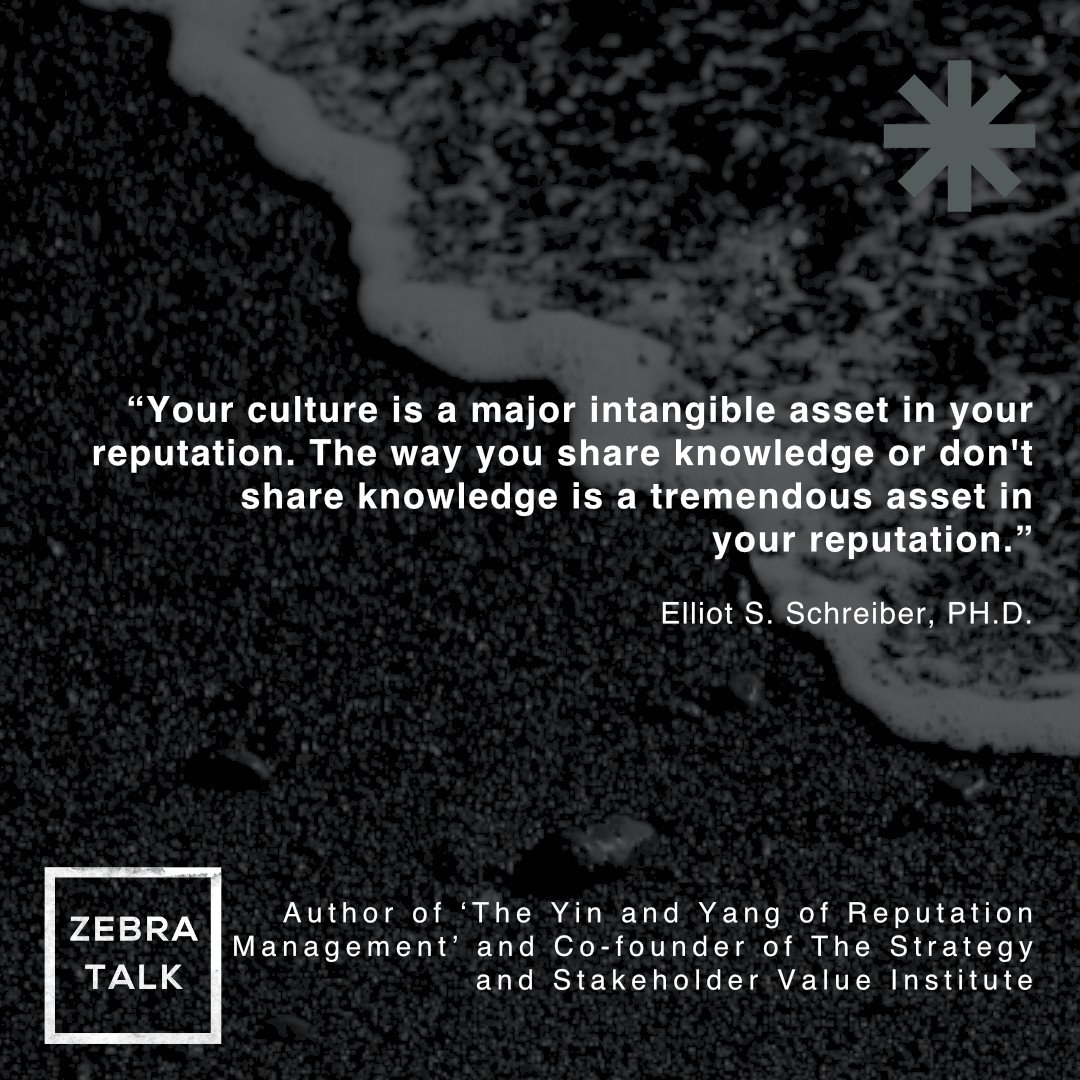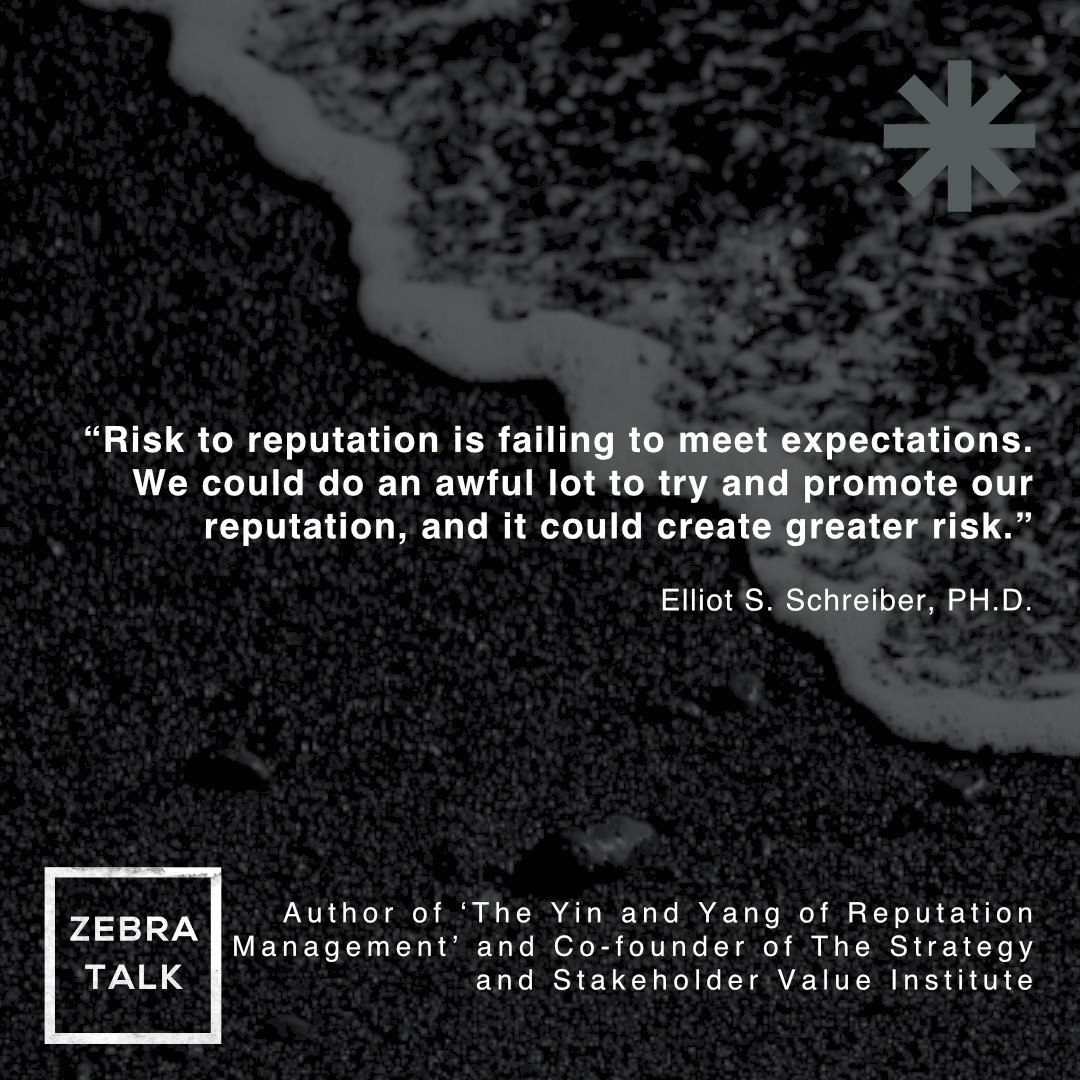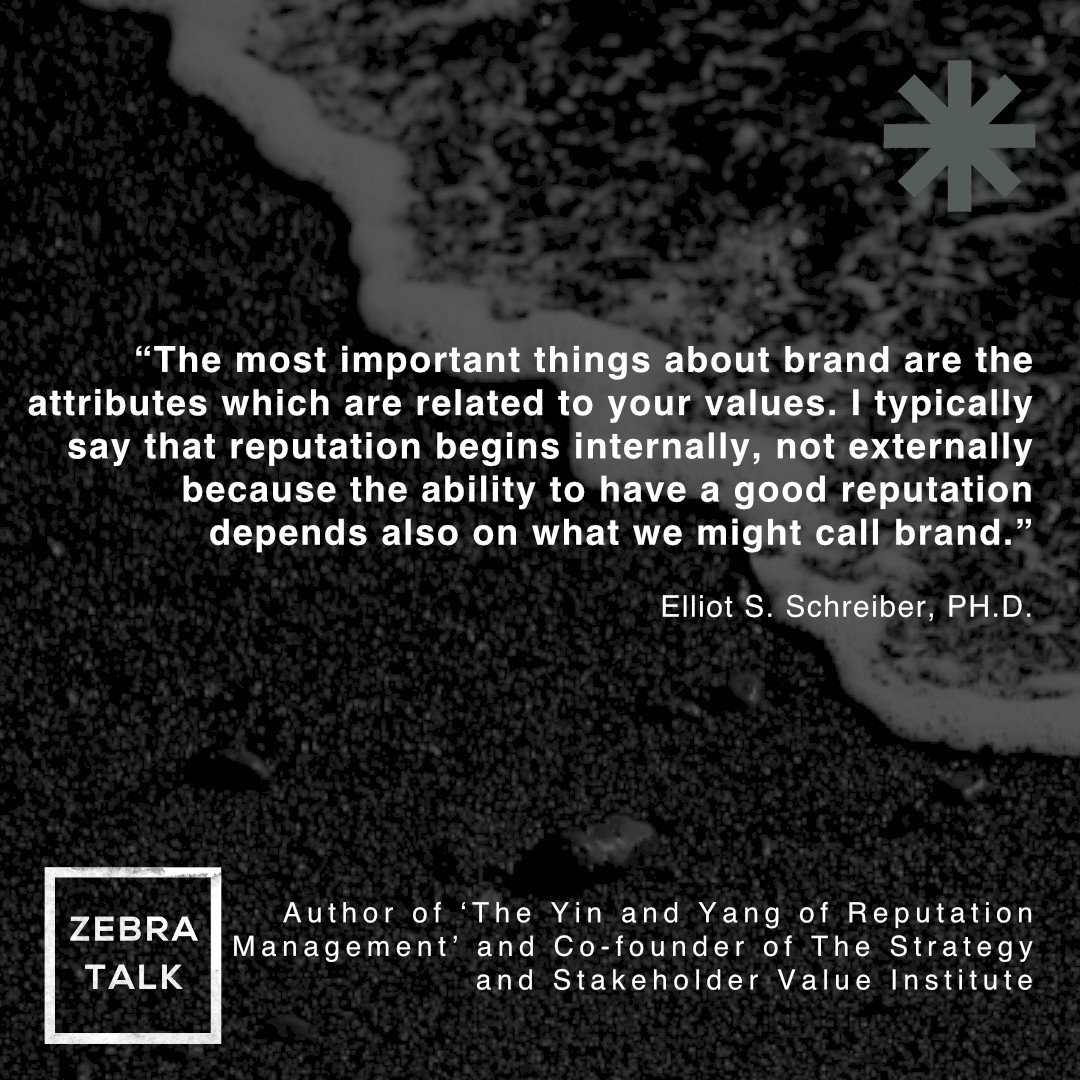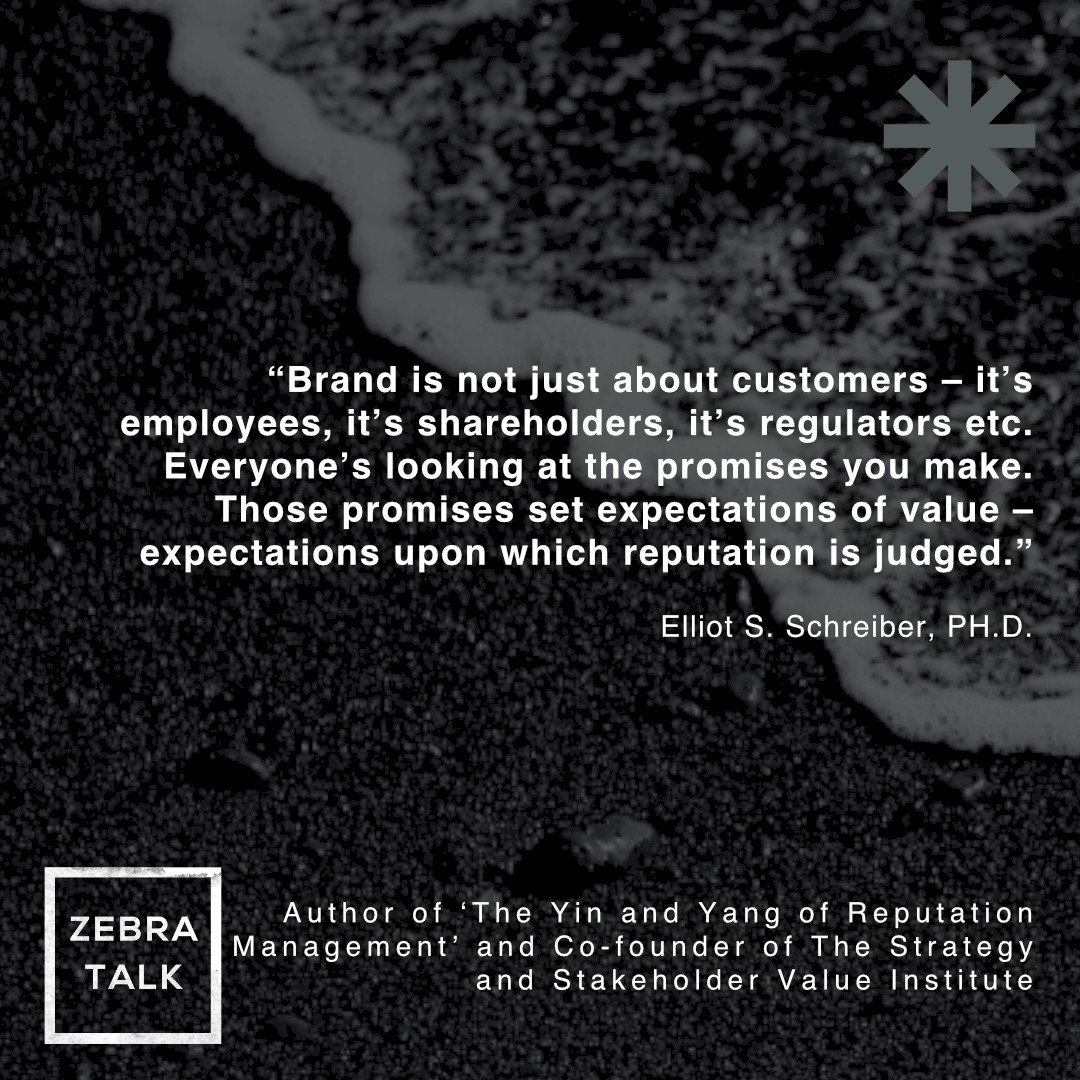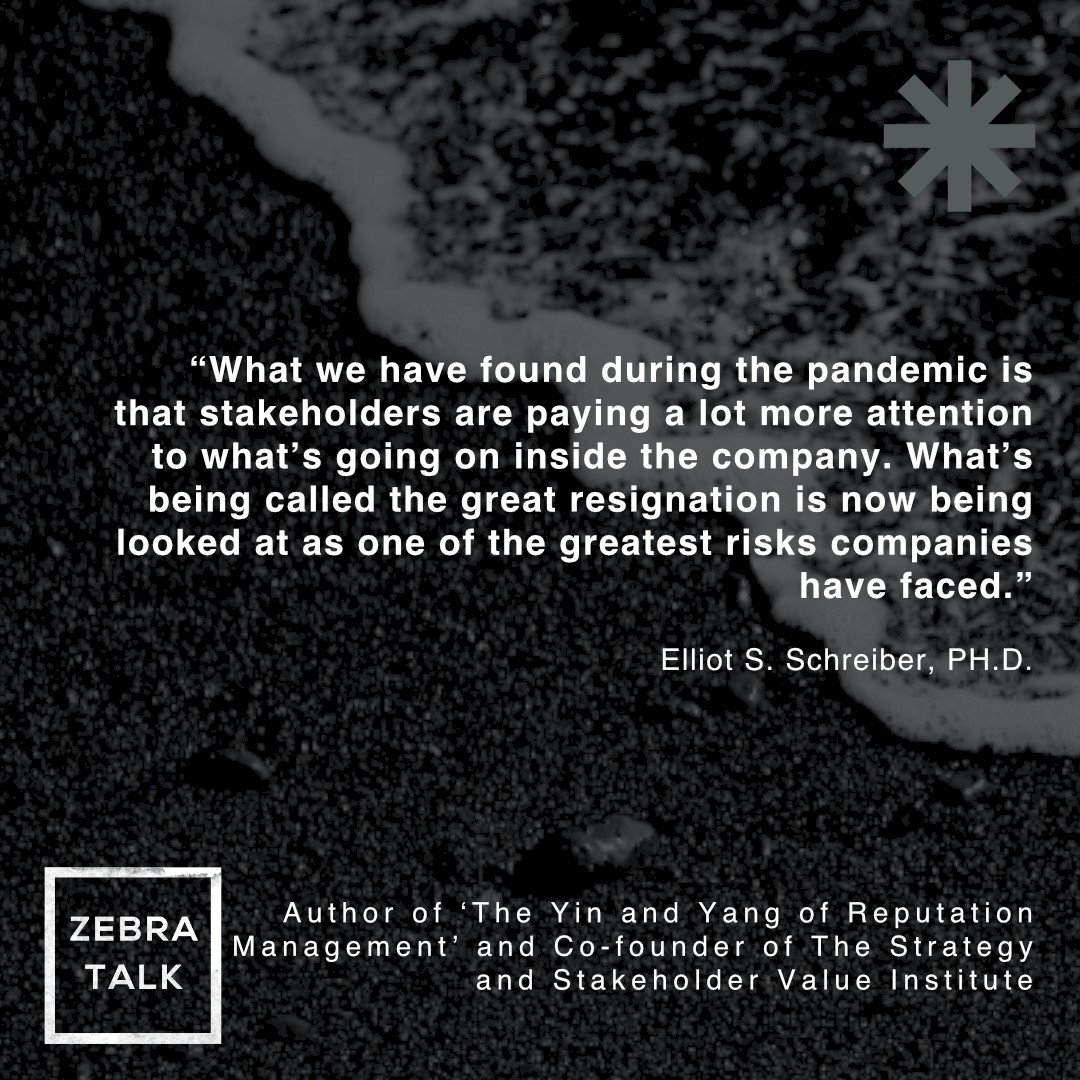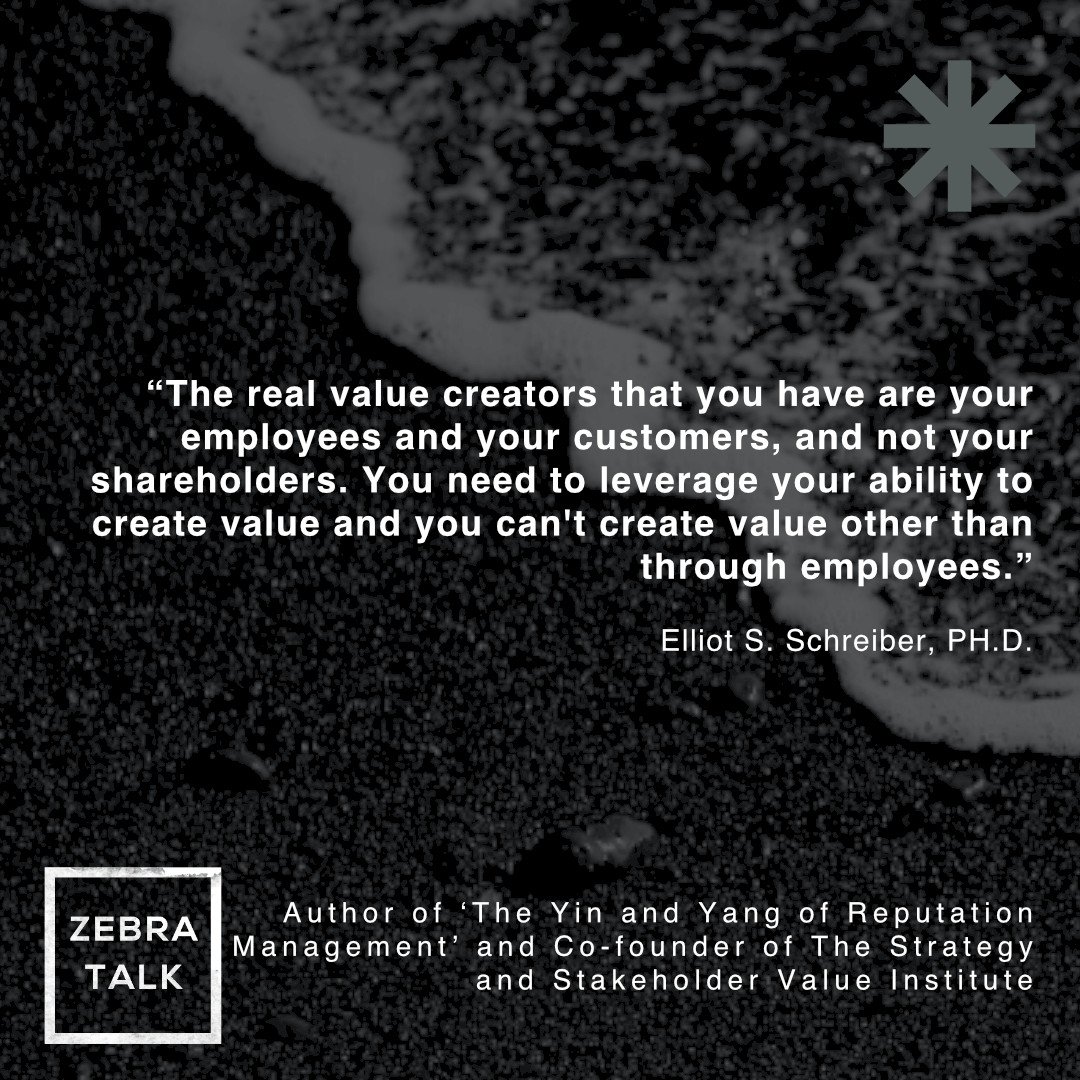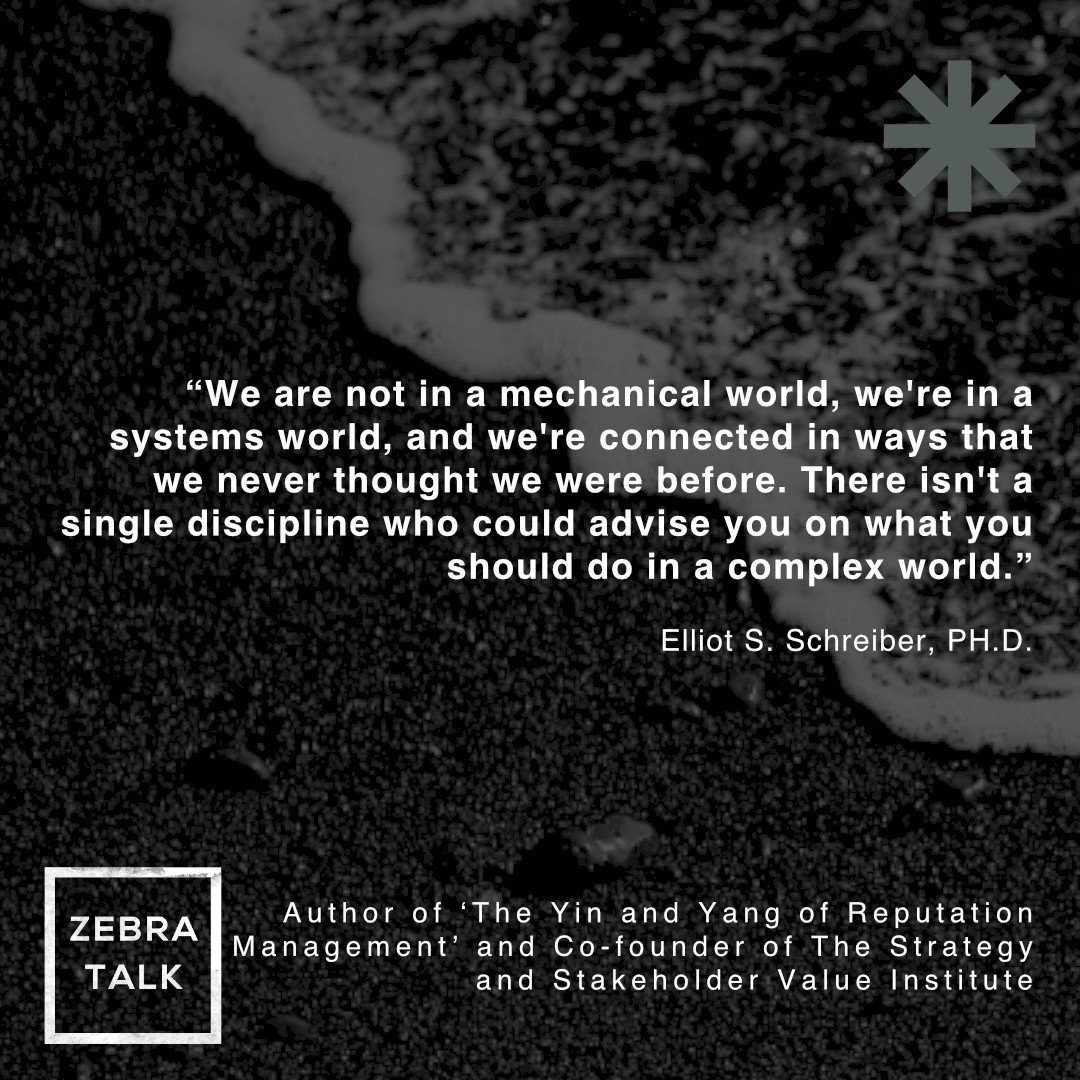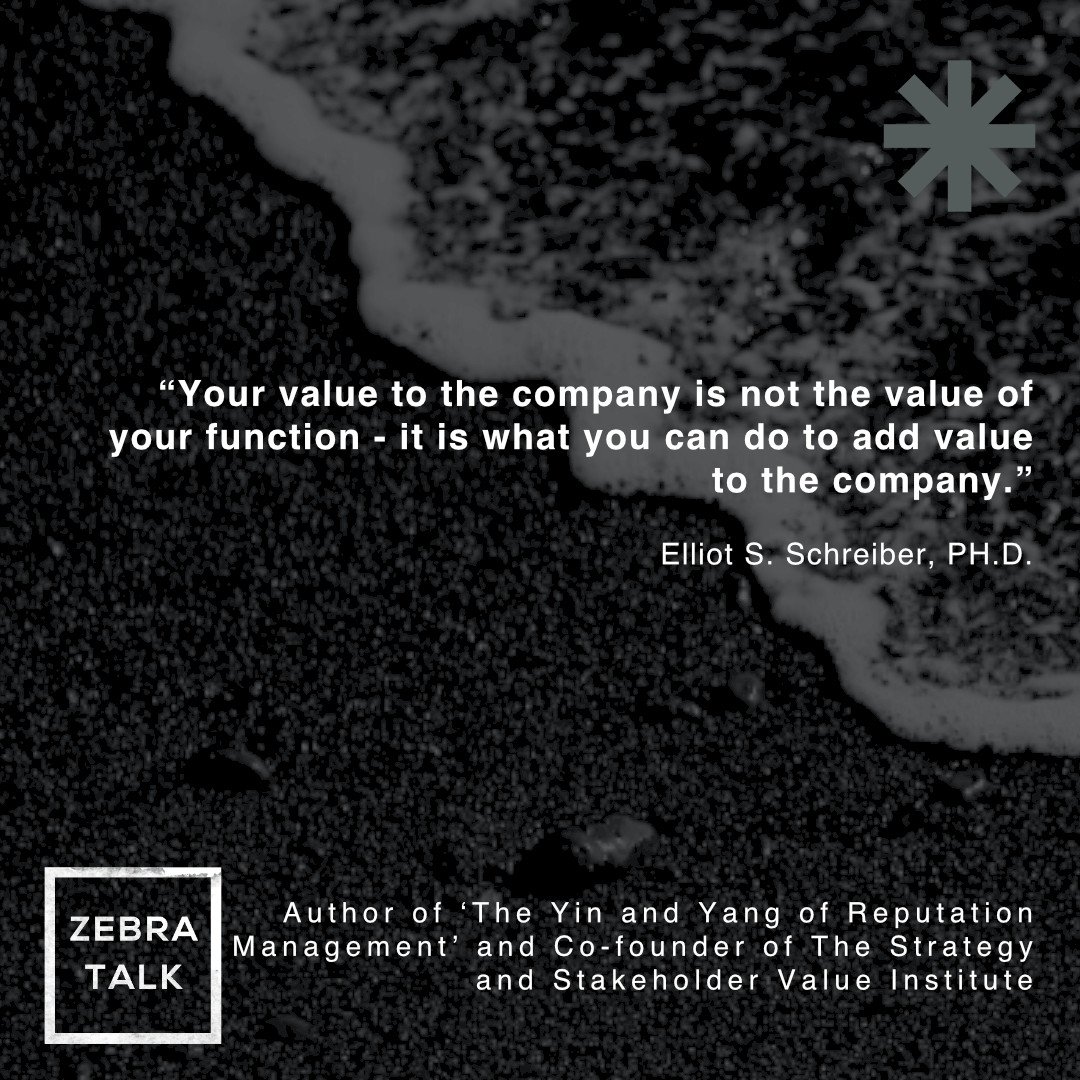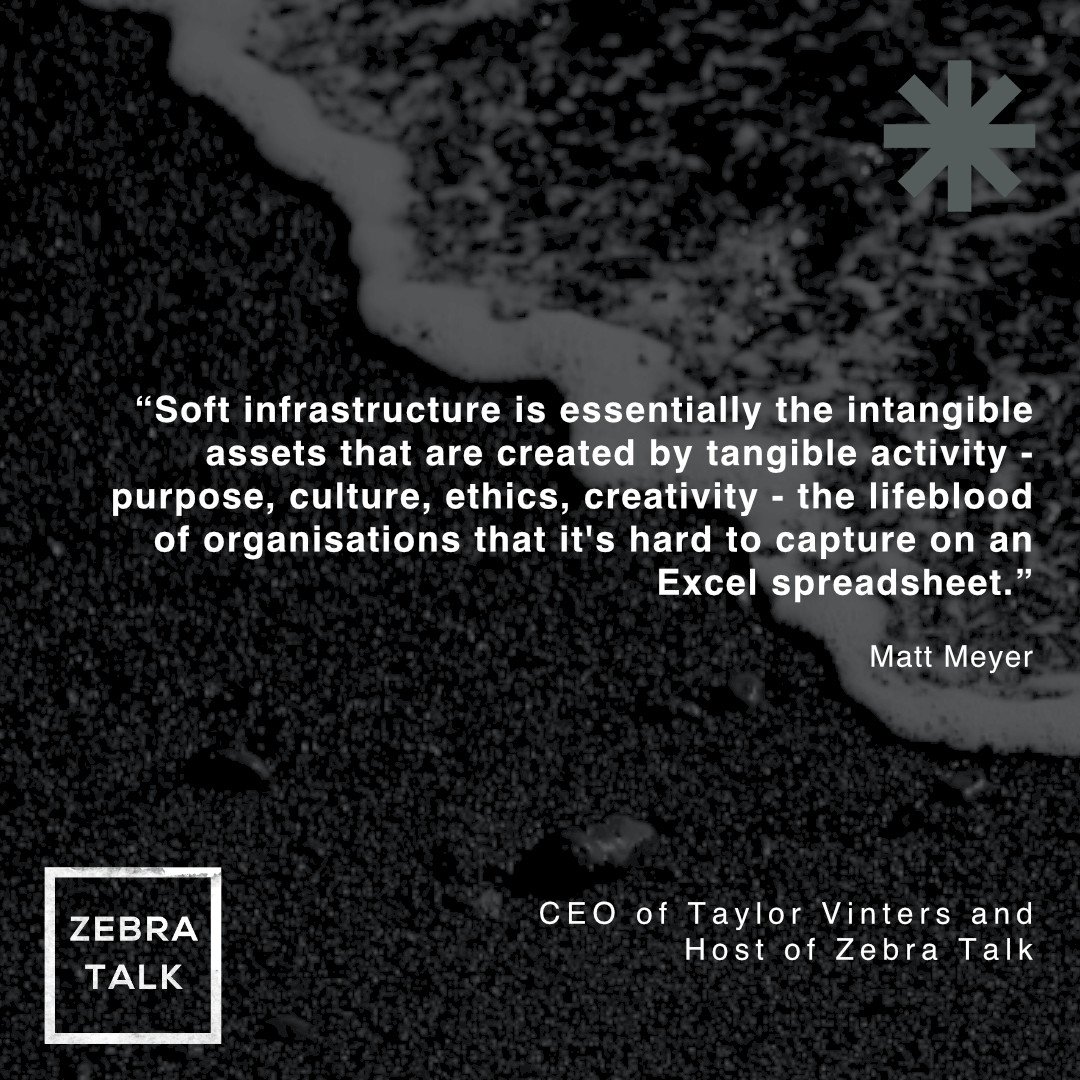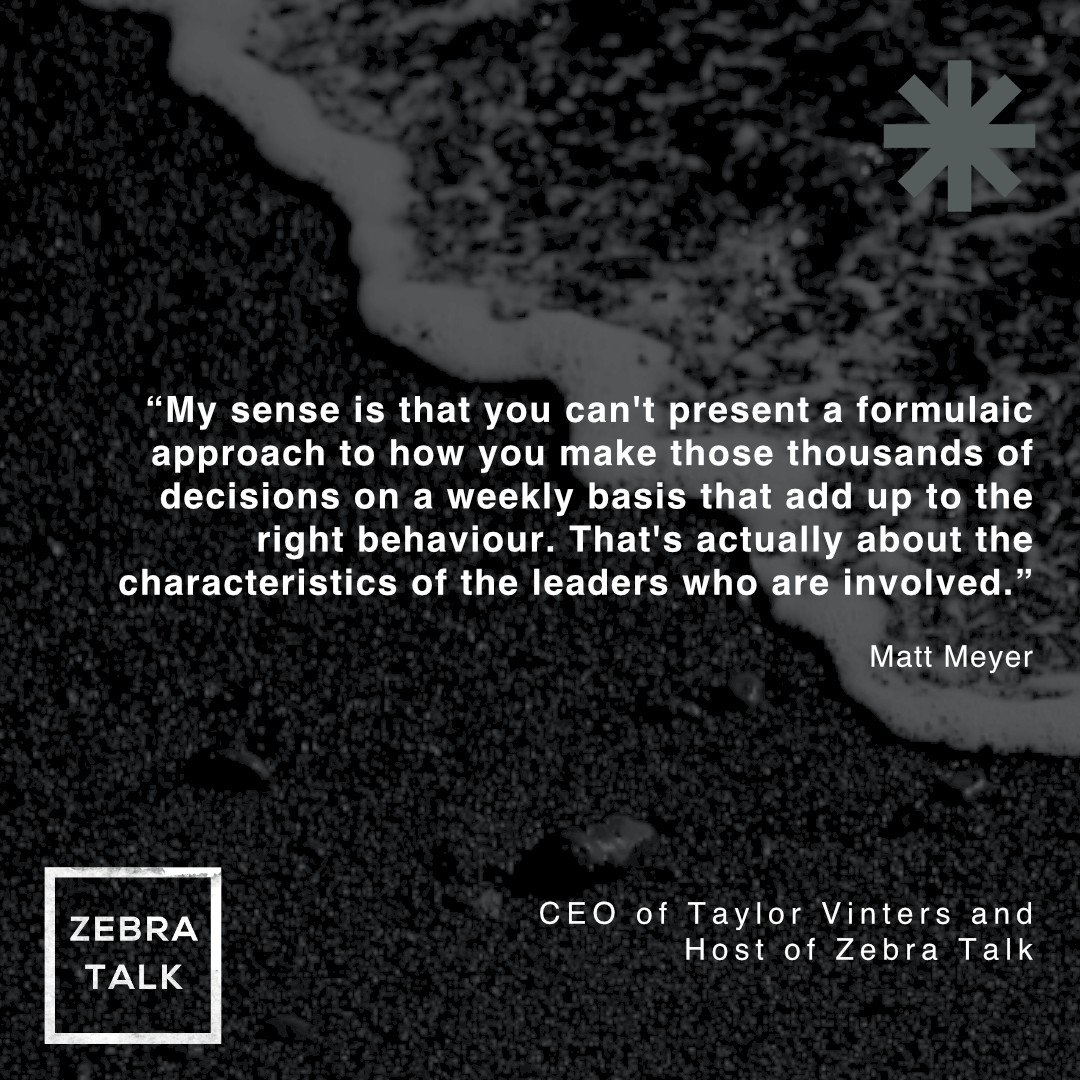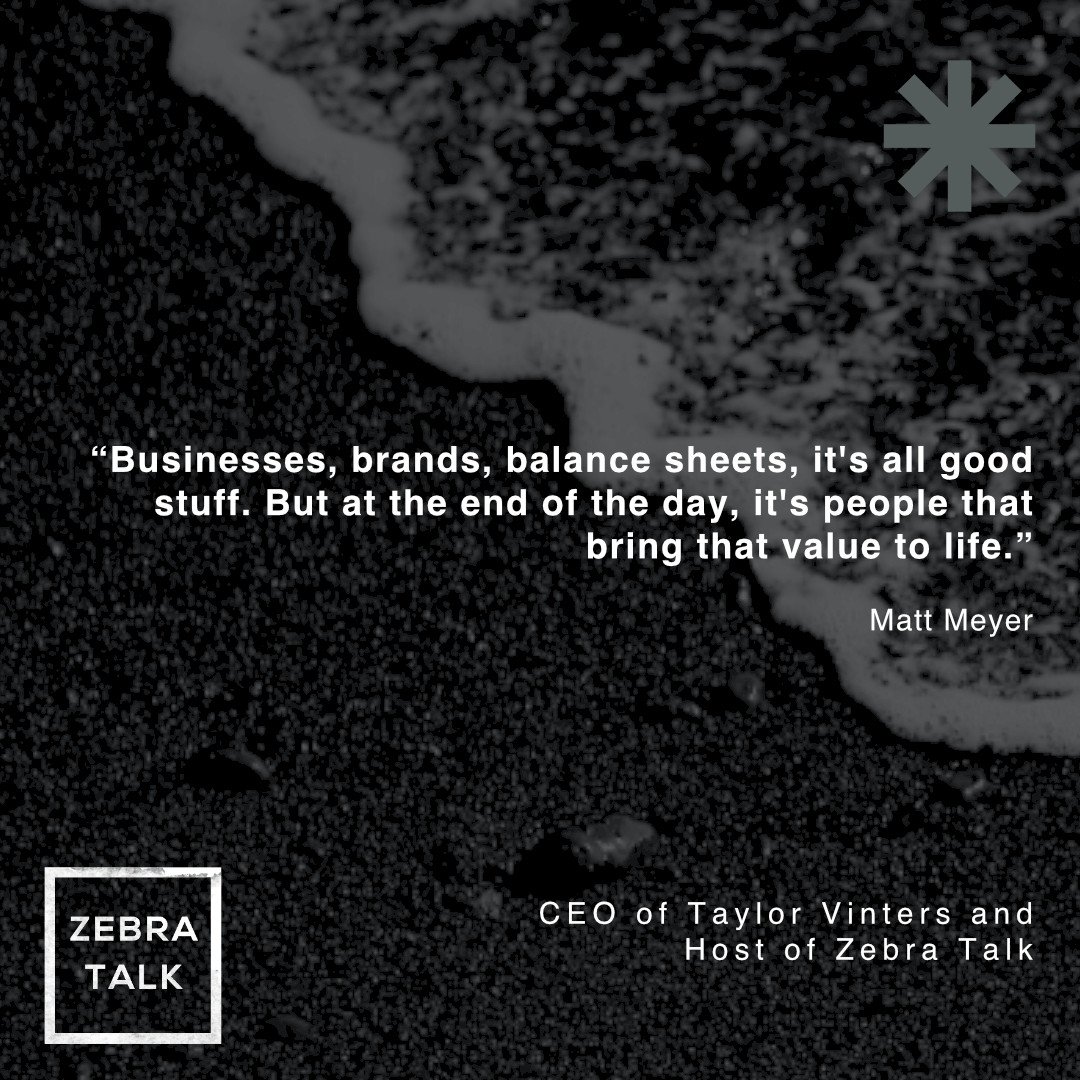ZEBRA TALK - Reputation: the power of understanding and prioritising your greatest assets
In conversation with Elliot Schreiber, Author of ‘The Yin and Yang of Reputation Management’ and Co-founder of The Strategy and Stakeholder Value Institute, talking about stakeholder expectation, organisational reputation, your greatest value creators and how you won’t find your most valuable assets on excel documents or balance sheets.
Explore key soundbites, listen to the full podcast or read the transcript of Elliot Schreiber’s episode of Zebra Talk below.
KEY QUOTES
SOUNDBITES
PODCAST TRANSCRIPT
Please note that this transcript is auto-generated from the audio file through Rev - Humans Working Side By Side With The Best Speech-to-Text AI. We believe this to be a good representation of the conversation, but it isn’t checked word-for-word and therefore isn’t 100% accurate.
Matt Meyer:
Elliot, absolutely fantastic to talk to you again. We met in London talking about the launch of your new book, The Yin and Yang of Reputation Management. And we finally get to have a proper conversation about that just between the two us that we could share with as many people as possible. Where in the world are you today?
Elliot Schreiber:
I happen to be sitting in a beach house in Southern Delaware on the east coast of the US. I'm about a block from the ocean and we can do the very British thing of talking about the weather and commiserating on how hot it's been on both sides of the Atlantic. We're like you in averaging 40 and we haven't had a break for a while.
Matt Meyer:
Well, it's hard to have a conversation about societal change and the toughest challenges facing the world without acknowledging that we're both dealing with a warming climate. I'm sat in London. I suspect it's slightly cooler than where you are, but the infrastructure can't cope. It's a challenge and perhaps we'll go full circle in that conversation. I wanted to kick off this Zebra Talk conversation, picking up on the process of writing your book, because when I read the book and when we we've talked about it previously, I was struck by how obviously it's reflective - you've had a 30+ year career working in marketing and brand through to strategy, through to education and consulting. There's a lot of rich experience there. And I wondered how much the book was about capturing that experience and looking back on that career and how much it was forward-looking. Certainly, on my reading of the book it was very proactive. It was about what people should be doing, going forward. And I wondered how that sat for you. Is it backward looking or forward looking for you personally?
Elliot Schreiber:
It was designed to be, as I said, in the beginning of the book, a legacy piece, not that I expect to be at the end, but it was sort of capturing a lot that has gone on in my career in the academic community, and my academic background, because I have the kind of unusual (and sometimes they call it serpentine) background of having been in and out of corporates consulting academics. And so I had been urged by my kids, by colleagues and others saying ‘why don't you write a book?’ And I'd been toying with that for some time. And finally, I decided that I would take the plunge and spend a year actually putting it all down on paper, but it is forward-looking because what I found was a lot of the things that I found with difficulties in companies that I dealt with, and not only inside, but consulting to companies globally is that they were not doing a lot of things that differently.
They thought they were, but they weren't. And so I've always believed that it's great to have description, but prescription is what people are looking for. It's okay. You're complaining. You're telling us what the problem is. Now, do you have any solutions? I suggested a few that have worked for me in the past and also admitted that some of the things that we've tried, particularly in the area of cross functional teams have had problems because people don't like to give up their own control. Silos have really become part and parcel of almost every organization, whether it's a law firm or whatever – people say ‘this is what I do, this is my remit and nothing else’. And so when you talk about bringing people together, the synergies, it changes. And so that was the forward-looking, like why things have to change. And also having taught in business schools at the MBA and Executive MBA level, I was really perplexed that the teaching was not much different than when I went through business school and the world has changed a great deal. And so this was why there were forward-looking parts. Can this highlighted section be used both as a sound bite and a quote card?
Matt Meyer:
that's really interesting, and I'd love to come back to two of those themes. One, the idea that business education, executive education is potentially a generation behind where it needs to be and how we might address that and how you are thinking about that personally, but also this idea of managing cross-functional issues and behavior, which I think is at the heart of how we address some of the challenges that we've got - two good topics that we can definitely come back to. As you know, at The Zebra Project, we talk a lot about the soft infrastructure of business. So contrast that with the hard infrastructure of business, which is perhaps the focus of some of that executive education we're talking about, but we talk a lot about soft infrastructure of business.
And in my mind that soft infrastructure is essentially the intangible assets that are created by tangible activity - purpose, culture, ethics, creativity - the lifeblood of organizations that it's hard to capture on an Excel spreadsheet. So we’ve talked a lot about that and when I've looked at your work and we've talked previously, it's clear that you see reputation as an asset class in its own right, that you see reputation as something that's both got risk and opportunity associated with it. And I wondered if you could just talk to us a little bit about reputation as an asset class and what the markets are, where that asset class is important.
Elliot Schreiber:
As I say in the book, reputation is misunderstood in my mind. Most people think of it as something marketing and PR do. And that leads to a lot of problems, because if you are delegating the reputation of your law firm or your company, or your university or hospital, or whatever, to a group of people who will only think about it as being creative in getting people influenced to see you in a certain way, you've missed the point. Reputation really is based more upon what you do than what you say you do. And what you say you do should be reinforcing what you do. So what I've defined reputation as is a decision by stakeholders, and they're all different. Whether they're employees or investors or customers, everyone comes at this differently and they define it differently, but they all have expectations of value. An employee expects certain things when they're hired, customers expect certain things and it's whether or not you've met those expectations of value better than competitors can.
And so it really is related to profitability in a sense. So the intangible really becomes tangible because people say, ‘how can you measure value?’ And I say, ‘it's actually very easy’. Look at your competitors and see how you're doing in terms of profitability, sales per employee, whatever - do you have to lower prices to get people to buy your product vs competitors? If so it's saying something about your reputation and the value of your reputation. And this actually started when I was working at DuPont many years ago, and I was asked by the Chairman of the Board to work on strategy as we got into two new, what they used to call, value-added areas - pharmaceuticals and electronics. So when we went out to the pharmaceutical area, one of the things that I noticed, I went around and talked to hospital administrators and thinkers, thought leaders in the healthcare area. And one of the things they kept saying is you're trying to get into the pharmaceutical area, but you're doing it like a chemical company. And at the time believe it or not, the head of our pharmaceutical business – his last job had been in our fibers business. I reported it back and what the executive committee said was, well, maybe we ought to start recruiting in the pharmaceutical business.
And the great shock to them was that the DuPont name didn't carry much weight in the pharmaceutical business. It did in chemicals, and so I created a ratio with our HR department, and what we found was if we went out into a university we could do three interviews to get one great chemical engineer from top schools, because DuPont was known as one of the places you wanted to work. If you were a chemical engineer in pharmaceuticals, it turned out to be between 18 and 20 interviews.
And so that difference of those interviews is a cost and the cost was not only time, but we had to up the salaries to try to attract those people away from AstraZeneca or Sandoz or any of the other pharmaceutical companies that they would otherwise really want to go to. I defined that for our Executive Committee and Board, as a measure of reputation in that industry. And so we're going to have to understand not how to do more advertising or PR, but the expectations of people from the FDA, from hospitals, from others and the difficulty they have in understanding why we're in the business and what value we bring. And so when you look at reputation that way you very quickly realize that risk to reputation is failing to meet those expectations. We could do an awful lot of things to try to promote our reputation, and it actually could create greater risk.
And one perfect example of that was we had one very energetic fellow in the PR department who decided to help our image in healthcare. He found out that in our experimental labs at DuPont we were experimenting with artificial blood and he put out a big press release and actually called a press conference, unbeknownst to a lot of us, and touted all this investment. What happened was we started getting calls from cancer patients, hemophiliacs, everyone saying ‘can we get this artificial blood? We need it’, and it turned out that it was at the earliest stages and it created what I consider risk because it damaged our credibility. People said, ‘well, then why did you hype it?’ There's an awful lot of that emphasis in reputation that actually people don't realize can actually hurt the reputation of the company as well.
When you look at reputation, it's based upon how you're utilizing your tangible assets in intangible ways – like employees. But the question is what is the intangible value of those employees and how much are you tapping into their brain power and others? And so your culture is a major intangible asset in your reputation. The way you share knowledge or don't share knowledge is a tremendous asset in your reputation. And so the more people understand how these things are connected, and that's why I call it the yin and yang, that kind of opportunity and risk that comes with making choices in business. Pete, can this whole paragraph be a sound bite and the highlighted green element be used as a Quote Card?
Matt Meyer:
The problem seems to arise when there's a disconnect between the experience and the brand. The brand is the brand, the reputation is often grounded in the experience - whether that's the experience in the market as a customer or a stakeholder in the consumer market, or it's the experience of staff. I'm interested in the idea that reputation is both an internal and an external risk and opportunity. And I just wondered if in your work you had a sense of whether organizations were focusing too much in one area or the other externally to the customer markets or internally to talent markets, you know, and where the focus should be going forward for people who are trying to lead around this idea that reputation is a valuable asset.
Elliot Schreiber:
One of the things I found when I had both responsibility for global marketing and communication, was the term brand was associated with marketing and only with customers. H the idea of brand was related to logos, I mean it comes from the term ‘to brand’ – I mean you branded your cattle to say that if it crosses your border then it’s still mine. And that's where the whole concept came from. But the most important thing about brand is the other components, which are the associations, which are related to the values you have. I mean, the attributes related to, and the associations - who you will align with and who you won't align with, those are all choices. And so I typically say that reputation begins internally, not externally because the ability to have a good reputation depends also on what we might call brand. Pete, can we have this as a quote card but with adjusted wording for ease of reading: ‘…the most important thing about brand is the associations, which are related to the values you have – who you will align with and who you won’t align with, those are all choices. …reputation begins internally, not externally.’
And that confuses a lot of people. They say, ‘well, they're very different’. Well, we can manage brand in different ways. We can manage the values, we have choices in that, but when every brand sets an expectation, we always talk about it as performance or judgment or function as a brand promise. But think about when you hire a new Attorney - you basically are making a promise of what it's going to be like to work for Taylor Vinters. Then when they get into the company, they make a determination of whether or not that brand promise was actually real or not. When we do branding of any sort, and we're realizing brand was not just about customers - it's employees, it's shareholders, it's regulators, or whatever. Everyone's looking at the promises you make. And those expectations are the basis, as I said, reputation’s based upon expectations of value that sets the expectations upon which reputation is judged. Can we make this a quote card but with tweaked wording to: 'When we do branding of any sort, we realise brand is not just about customers - it's employees, shareholders, regulators etc. Everyone's looking at the promises you make, and those expectations are the basis of reputation - the expectation of value sets the expectation upon which reputation is judged.'
So it's both internal and external. It can't be separated. There are externalities that everybody talks about, but the externalities are internal. Also, you know, Glassdoor is a very well-known measure that MIT researchers have said is the best measure of employee satisfaction they've found because it can't be tampered with by the company. And I don't know a student that I've ever taught that didn't look at Glassdoor before they accepted a job. If they have choices, you know, ‘I don't wanna work here because look at the things they're telling me’, you know, it's from employees and and ex-employees, so all of this stuff has to be looked at, and that's really the more difficult things become the more, some executives back away from it and say, ‘oh, it's way too complex’. You know, internal, external look - you spend a lot of time on the R and D of your products on the manufacturing of your products, the quality of your products and how they're judged by customers. Why aren't you looking at the connectivity between how you're running the culture of your organization and what it does to your ability to develop and create and deliver value to your different stakeholders.
Matt Meyer:
Yeah. And at one level that there is a simplicity in what you've said, which is that it's really about whichever stakeholder group it is. And I think it's important to define that stakeholder group widely, but whichever stakeholder group it is. It's about the extent to which their experience lives up to the promises that you've made either consciously or unconsciously through a range of things, which I think includes brand. When we talk about reputation management, my sense is that there's a lot of focus on the negative side of that. It's how do we manage reputational damage? How do we deal with crisis? Reputational crisis - is your experience that there's an equal amount of work going on in terms of how we build the right reputation, how we make the right promises? Is that a feature of leadership and strategic thinking at the moment, or is that an opportunity?
Elliot Schreiber:
That's a huge opportunity. Aon Insurance does surveys every year. They publish the survey, they take about 5 or 600 executives around the world - Board members, Executives, and ask them to rank the risks that they face. Virtually every year the risk to what they call brand and reputation is in the top five or six. And it depends on what's going on. Currency changes, obviously now it's the threat of war and supply chain and everything else, but reputation is always there. And when Aon probes down, they find that Executives say it's a risk, but they don't really know how to manage it. And the way they manage it primarily is through crisis management. So when you think about crisis management, you're managing something after the fire has already started, and you're trying to save whatever assets are left. And that’s why I've been trying to work with people on the internal audit and enterprise risk management, more closely to partner with them to understand how we can help companies understand the reputational risks that occur and how we can have a better understanding of the risk of culture. As you may know, internal audit and enterprise risk management by their own admission, do not do a very good job of managing culture. But we also know that if you look at corporate crises and reputation, whether it was Volkswagen or Boeing or any of the other major crises, 70% of those crises were because of internal breakdowns of culture. Well, I don't think they were breakdowns of culture. I think that was the culture and it ended up causing problems. And so much of that is to look at the incentives you give and whether or not those incentives are misaligned with the real action, because people will move toward the incentives.
And they'll do things of which they're incentivized. If you want to really understand your culture, and you want to have what people call a healthy culture, that depends on the kind of business you're in. I mean, a healthy culture in a hedge funds is not the same as a healthy culture in a hospital. A healthy culture is one that lets you achieve your objectives with the least amount of risk. When you look at it that way, we have to find ways to identify potential risks and bring them to light before they actually metastasize. And so crisis management's really important, but it's sort of like saying, ‘well, I'm running a business, I'm going to forego any type of fire prevention management. I'm not gonna look at whether or not I have too many plugs on my outlets. I'm not gonna look at whether or not I have papers in places that could catch on fire. All I'm gonna do is worry about whether or not the fire department can come in when this place catches fire’. It wouldn't make any sense. And your insurance bills would go through the roof. I know with a lot of insurance companies, they've been trying to develop risk assessment tools so that they can determine whether or not the insurance of the company should be higher or lower compared to others.
Matt Meyer:
Right. Which goes to you know, how do you value particular risks, right? The point that you made earlier. I mean, I have a viewpoint which may by admission, be a western world service economy viewpoint. But my view is that we're increasingly seeing external reputation aligning with employee experience. So the employer/ brand employer/ employee brand experience is reflective of the customer experience. And I think in that world, if that's right, if my viewpoint is right, I think in that world, we are definitely seeing a much more pressing need for people to align their internal culture, their internal organizational experience with the expectation they're trying to stay in the customer market. And the disconnects that we see in customer reputation and experience often come from the external experience and, you know, culture, organizational behavior and experience doesn't happen by chance.
I mean, we both could cite examples of organizations where, you know, all of the effort's gone into the R and D or it's gone into the product placement and the brand strategy around product, but not around organizational experience. So I see that doesn't happen by chance. I guess that journey starts at the top. It's about structure. It's about governance. It's about leadership and the board in the work that you've been doing. I mean, are you starting at that level or are you working further down in the organization?
Elliot Schreiber: Below Pete can the whole yellow and green highlighted wording be used as a soundbite and the green be used as a quote card.
The big thing right now is everyone's talking about ESG. To me, the most important thing is the G if you go down to governance. The core of governance is the ability to make the best decisions on behalf of the organization and its stakeholders and larger society. Good decision making - the definition of good is a values definition. Santiago, who's the president of IE university in Madrid wrote a brilliant piece in which he said to executives, ‘you're making choices of values in every decision you make.’ Every business person makes selective division decisions where to invest, where to divest, how to manage your portfolio. Those are all values decisions based upon where you feel you can create the greatest value. What we have found during the pandemic is that (particularly external) stakeholders are paying a lot more attention to what's going on inside the company. For example, what's being called the great resignation is now being looked at as one of the greatest risks companies have faced.
Not only are they losing talent, but they're losing investors because people say, ‘well, if that many employees are leaving, this place has gotta be in trouble.’ I know because in my previous Executive role, I had the responsibility for the data collection and evaluation of both our employee surveys and our customer surveys. And what we found was that there was a very, very strong correlation between employee and customer satisfaction. In a regression analysis, it was at like 0.8, which meant there was very little variance left in terms of explaining. We didn't know whether or not employees made good customers or good customers made happy employees or whatever, but we knew that there was a tremendous relationship. I went to our Board at Nortel and our incentive program was all about financial results. And so we convinced the board to change 50% of our incentive bonuses to reflect customer and employee satisfaction. And the result on our stock price was amazing. Financials are a proxy, you know, of what you're doing in other areas. And so we started doing better by customers, which increased our market share and other things. I can cite examples of where companies have found they didn't recognize the connectivity between their internal and external and it affected their overall reputation and their ability to compete well in the marketplace.
Matt Meyer:
It's interesting. I mean maybe this brings us back to where we started around executive education, and education more generally. But my sense is that you can't present a formulaic approach to how you make those thousands of decisions on a weekly basis that add up to the right behavior. That's actually about the characteristics of the leaders who are involved. I'm interested in your views on the extent to which we have a system, whether that's the education system or whether that's the contemporary business culture, which is too focused on functional development into a leadership role, rather than looking at people's characteristics, that their behaviors that, you know, what the military would call ‘the right stuff’.
Elliott Schreiber:
We had this discussion when I met you in London. And, and I think we're on the same page as that, yes, you want to hire people for their expertise, but you also want to look into their character. This is often not what boards look at when they hire a CEO or other officers like the CFO or others. They're not looking at the character. They're looking at what they've done in previous jobs. You know, you can go through whether it's Enron or WorldCom or any of the companies that have had problems, where had you traced back, you would've found that that person had done some wrong things previously, but because we can't give references other than they worked here between the years so and so, and so that just got passed through. And so it really is about the character of the individual leaders, the way they make decisions.
And as I said, you know, you have selective decisions. So you say to companies, you know, ‘let's talk about your aspiration’. What is the, what is the aspiration you have for this company? How do you want people to think of you in the marketplace? Do you want 'em to think that you're the least expensive, you know, you’re Walmart, or do you want 'em to think you're a BMW or Mercedes? Where do you want to play in this marketplace? What's your aspiration? And so once they define that, I start saying, ‘so let's look at all the things that you do now, are they reflective of your aspiration?’ And if not, what has to change and what you usually get down to is a point where somebody says, ‘oh, we can't change that.’ And I ask, why not?’ Oh, no, no, we can't’. I go, ‘okay, you wanna change your aspiration then?’
No. Okay. You, you can't have one without the other. I could aspire to be the greatest swimmer in the world, but I'm not going to be just because that's my aspiration. And so it, it really is reflective. And so every leader has selective choices and it comes down to the character. Do you worry about your employees or do you think of them as just, well, ‘I'll find new employees’?. If they leave, big deal! I've heard that from executives, yeah, ‘big deal - there's good people on the market. I'll just replace them’. That's a selective choice. You don't think your employees know that? Or my only concern is profits. I don't really care about anything else. And so you're making a statement - what you do, but you don't care how you do it and how you do it is as important as what you do.
And that's where people judge you is how you've done it. You know? And once again, if you're a hedge fund or investment firm, your employees know that this is what is expected, it's just drive as much cash as you possibly can. But that's not the way people would expect, you know, a law firm or others. And we can see that in consulting firms where, you know, McKinsey actually advised both the Purdue family, the Purdue pharmaceuticals and Johnson and Johnson on how to make profits off of opioids. And part of the plan, which was discovered in court was they actually had a plan for keeping people on opioids and having doctors prescribe more - well, it's pretty unethical, but as they said, it increased profits. So is that good? Certainly not to me, but that's a choice they made.
Matt Meyer:
I mean, I think in, in the book, you talk quite eloquently about this idea that the dichotomy between looking after broader stakeholders and looking after shareholder value of profit is a false one. And, you know, I think it seems to be relatively easy to hide behind those being two separate things. But actually the more enlightened approach, or the more ambitious leadership objective, is to try and manage across both of those sets of interest. And are you sensing that leaders are interested in that sort of multifaceted approach to what they're trying to achieve, to how they measure value and contribution? Or is it still a dichotomy?
Elliott Schreiber:
Well, I think it depends where you are. I think in the UK and the continent, there's a lot more attention to stakeholder value vs shareholder value than in the US. It's very easy for companies to hide behind what they call Delaware Law saying that shareholder, but that's not what the company says. You probably know the Delaware business code says that the board needs to operate on behalf of the organization. And it doesn't mean that you have to go to the belief, which some people do, that shareholders own the company that they don't just invest in the company, they own the company. Well, I happen not to believe that because the company, if they only owned it, they don't make the decisions. Clearly they just make decisions on proxy issues generally and elect the board members and others.
But I think most companies are coming to realize, and the business round table in 2019 put out a statement which they called The Purpose of a Corporation in which they said companies should operate on behalf of all stakeholders and not just shareholders. That was more talk than reality for a lot of those companies, 181 of 'em, but they're striving. At least they know that's what's being expected. What companies are realizing is that the value creation for them does not come only through shareholders. So I ask companies, I say, ‘you know, if a shareholder gives you a thousand dollars, how do you maximize that thousand dollars?’ Well, you could put it in the bank, but you maximize it through your ability to get your employees to develop products and services that customers really value. And so it's your employees and customers that take that thousand dollars and turn it into millions.
And shareholders understand that the real value creators that you have are your employees and your customers, and not your shareholders. You need to leverage your ability to create value and you can't create value other than through employees. There's almost, there's no way. And any hopes of AI. It's not, it's not going to replace the ability of a person to deal with a client or customer or whatever, to give them confidence that they're dealing with the right company and that they're gonna keep their promises.
Matt Meyer:
I think there's a huge amount of work to be done on that idea of value and how we create it and measure it. And, I always think about value as a kind of 3D thing rather than 2D thing. So it exists in terms of size and volume, but it also exists in time. And I think our understanding of how value is created and sustained over time is something that business generally is poised to look at more closely, particularly when we're looking at a whole range of stakeholders, for whom that timeframe is variable. It depends what your perspective is and where you sit. So value creation - fascinating topic, as far as I'm concerned.
Elliott Schreiber:
The fact that for the first time in history, I think employees have power and know they have power over organizations that, I mean, is the talent in play. I usually tell people; your talented employees know they have infinite possibilities on the outside. You're stuck with the worst employees because nobody wants them. You either get rid of them or they just become a drain.
Matt Meyer:
I mean, we talked about the great resignation, but I came across another phrase yesterday, which was, about quiet quitting, which is people who are doing the bare minimum in their organizations and getting away with it because they've changed working arrangements. And I think, you know, it goes to your point, which is actually, how do you take that thousand dollars and bring to life with human beings that actually can create value from that thousand dollars? And, you know, we risk being in a world where we are not putting the infrastructure around that opportunity, but either way, it all comes back to people, right? So businesses, brands, balance sheets, it's all good stuff. But at the end of the day, it's people that bring that value to life. And it's people that make an assessment of how valuable something is.
I'm really interested to hear some positive stories. ‘Cause I think, you know, we talk a lot about the businesses that have got reputation wrong, and in the book, you know, some great examples of that, but, but who's getting it right. You know, what's a good example of successful leadership in this domain?
Elliott Schreiber:
Well, I think Lego has been a star for a long time. They started as a company, an educational company, and they've stuck to those values and have not strayed from them. They've made some mistakes, but when they've made the mistakes, they've corrected them really quickly to go back to the original purpose of the organization. We hear about purpose. It's really, why do you exist? And Lego has a very clear understanding of why they exist and exactly what they do and what they will not do. Another Danish company, Novo Nordisk has done a tremendous job. I sat in a meeting with the former CEO of Novo Nordisk who said, you know, we believe that our mission is to stamp out diabetes and they make mainly insulin and other diabetic products stamp out diabetes in our lifetime. And someone said, why would you have a mission that would put your company out of business?
And his answer was what I tell employees is if we're smart enough to develop the cure for diabetes, imagine what else we could do. And it really is inspirational. I think there are companies that are trying to recover like Johnson and Johnson. Johnson and Johnson has gotten a black eye in recent years for a lot of different things, but at the core of Johnson and Johnson is this credo that sets its priorities that customers and employees and the communities come before shareholders. And they've always believed that as one of their chairmen said, if we do right by our employees, our customers and our communities, the shareholders will be well served. My son works for Johnson and Johnson. So they are able to continue to go back to this touchstone and say, what did we do wrong whenever they've aired, they've tried to recover by going back - clearly leaders, as you said, leaders have made decisions in the past who've led Johnson and Johnson that people kind of said, well, that wasn't very cradle-like, but that's even, you know, if you can say, that's not very cradle-like you have a touchstone as bill George used to be the, the CEO of Medtronic calls it the true north, you know, where's your true north and what will you not do because deviates too much from where you really believe you belong. And, and the things, the values that you belong. A number of companies that in, um, I think Novartis over the years has proved that it's a pharmaceutical company that has some strong values, even to the extent that they built a campus to be attractive to employees because they recognized that they weren't in London or near New York. And to go to Basel Switzerland (I happen to like Basel), but to go to Basel, Switzerland was not gonna be someone's first choice rather than going to London or, or some another, uh, city of that type.
They built a campus that is just beautiful to be kind of a place that people really feel energized and, and wonderful. So all these companies that I've mentioned, what they've done is they've really looked at not only values, but they really pride themselves in their culture. Also know that if they air, which every company is going to make a mistake, I mean we're all humans, that they have a place to go back to. They have somewhere that they can go back and say, look, Lego was founded on this philosophy - I think the Danish thing ‘just good play’ or something like that, you know, Johnson Johnson, the credo, which was developed at the time before they actually had public money, they were basically saying to people to, to investors, if you want to invest in our company, this is what we believe in, you know, make the choice. Which I really would hope companies will start to do rather than being pushed and pulled by different stakeholders to go back to how do they want to run themselves?
And if they define the stakeholders that really resonate with the value that they're delivering and part ways at times, with people who want them to do things that would pull them away from their mission. You know, you can't please everyone. In marketing terms, a target market is a select group within a larger market. And everyone has a target market. You have a target market that you're after and whatever. And so you can choose employees that way. Companies can very clearly say to share shareholders. This is how we're gonna run the company. If they're free to invest in other places. And most institutional investors, American express, and the Deutsche bank, they'll stay with the company long term. What companies have been bounced around by are these day traders and people wanna flip a stock. The volatility of stock was never that way 20 years ago, it's just changed a great deal.
Matt Meyer:
I couldn't agree more. I mean, the thread that comes out of everything that you've just said there for me is about having a reference point. And, you know, organizational purpose might be the reference point. Culture might be the reference point, ethical or behavior reference point. But, actually you need something to come back to either when you've got no idea what to do, or you're doing something, and you've got a feeling it's not the right thing, or when you're just faced with complexity, many of the Zebra conversations that we have back to a single thing, it's actually be conscious about what your reference point is, whatever it is, and be consistent. So I promise to talk a little bit about managing cross-functionally, and maybe that's the right or the wrong thing to end our conversation on, but I'm interested in your kind of summary of actually if you want to be a leader who embodies these principles at a practical level, how do you manage reputation cross-functionally to a positive outcome for whatever stakeholder group that may be?
Elliott Schreiber:
Well, I think we go back to the notion that somehow, reputation is not enterprise-wide, but we can delegate it to either marketing or PR. And if we go back to the fact that it really is enterprise-wide, then the question is, how do we get the information to make those decisions? Now, one of the sessions, the first session that you were good enough to host at your firm in London was the one with Oonagh Harpur - she's an independent director of KPMG and some other companies, uh, where the board's getting the information they need on strategy, culture, and risk, you could characterize that as decisions that would affect their reputation. Traditionally, what you do, if you're a board member, is you call on someone who should be able to give you that information. Maybe the general counsel, maybe the head of PR, maybe you call on the head of risk management or whatever they give you the best advice they can from the discipline in the way they've been trained.
If you look at the value chain that was developed by Michael Porter at Harvard in 1979, we still operate like that, in which there are silos. And they pass off this development from internal materials to selling those materials. And every group adds value until it is ultimately decided by the marketplace, whether there's value. The world has changed a tremendous amount since 1979, not the least of which was the internet that took all the knowledge that companies thought they possessed that no one else could see and pushed it out into the marketplace. And so we, we have to start thinking of the fact that we are not in a mechanical world, we're in a systems world, and we're connected in ways that we never thought we were before. There isn't a single discipline who could advise you on what you should do in a complex world.
And so what I've advocated is that companies do not operate in a siloed capacity where everybody has their own system. I mean, I operated like that, and there were people next door to me, executives, I didn't know what they did. I really didn't. I've had situations where I've created cross-functional teams, where the first meeting is for them to introduce each other. These are colleagues that sit next to you and what you do and what information you have, because information is power. And within silos, they protect that information and don't share it. Robert Eckles. He was at Harvard, he's at Oxford now, he said that, you know what happens with silos? They don't share information. They protect that information. Not only does that drive up risk, but it makes decision making very, very difficult. And so if you could get all those groups working together in a permanent way, when you needed information, you have a perspective that is a perspective of how all these different stakeholders will react both positively and negatively.
And so you can make a decision with a lot more confidence that you know who you're gonna irritate, because every decision in our world today is going to make some people happy, and some people unhappy. You need to make sure in business that you're making the people who really can create value with you as happy as possible, and others don't drag you off your reference point, as we say. And so I think the only way to go is there's this cross-functional effort. I've put them in place in a couple of companies and I've had successes and failures. The biggest problem is that no one wants to give up their power within the silo. And I understand that having run a fairly large group, global group of people, if someone said, you know, now you're just gonna be part of a cross-functional team, it kind of shakes you at first until you understand the value.
Your value to the company is not the value of your function - it is what you can do to add value to the company. And so you can stop defining your value within your narrow scope, whatever discipline that was. Now, we go back to business schools. It's exactly how they teach people. You have your finance course, you have your accounting course, and then you have your marketing course and your leadership course and whatever. And each one of them teaches you the importance of that one function. The biggest producer of business school students historically has always been finance. And they get to think like finance people. There's nothing wrong with that. But if you could take case studies and I had advocated for this, but once again, faculty, don't like to give up their own capabilities for doing things. We used to refer to faculty as a group of anarchists sharing a common parking lot, take a case study.
And wouldn't it be great if you could start it, let's say in finance, and then you pass the same case study to marketing, management, whatever. And each of them added the value and students could then see, oh, now I'm seeing it from a different perspective. You know, they don't want to use the same case study or if they do, they want to teach it only from their own standpoint, uh, Roger Martin when he was at the university of Toronto, the Rotman school advocated for that. And they'd used it for a while. I don't know if they still are, Roger’s retired now. And when he was Dean, that was his philosophy as have each function or each department within the business school teach from the same case. So that students come out with a management perspective rather than just a business perspective that is within one discipline.
Matt Meyer:
Which in itself as an approach reinforces the idea that there are a bunch of different stakeholders in any decision or experience, whether those are external stakeholders or in the case of the silos that we're talking about here, internal stakeholders. It's interesting. I mean, we've drawn on a number of examples and thoughts from, I guess, corporate America, both in the book and in this conversation. But the exciting thing for me is the opportunity, which I think will be present for many of our leaders to build these things in by design for younger, newer, more flexible businesses that are going to be supporting the economy going forward. And I think this idea of building cross functionality by design in new organizations is something that we'll see a lot more of and will really take off going forward.
Elliot, thank you for your insights. I think it's been a really interesting conversation and, you know, I'm keen to carry on the dialogue, which I'm sure we will in different forums about many of these ideas and, how we can learn from perhaps what goes wrong to inform the design of new and more progressive or enlightened companies. You mentioned a conversation that we'd had earlier in the year - one of three, and I'll signpost that for our listeners. So it was a collaboration that Elliot was doing with the Enlightened Enterprise Academy, which is driven by some of the issues that we talked about around executive education, which is a series of conversations of which we've picked up on a number of the themes today. So I'll make sure that’s sign posted to our listeners. Thanks for your time Elliot. Great talk.
Elliott Schreiber:
Oh, thank you for having me, I really appreciate it Matt. I appreciate you hosting those events and having me on today and I hope we can continue the dialogue.
Matt Meyer:
Great. All right. Well, look after yourself and we'll talk.
Back to the ZebraTalk home page.





